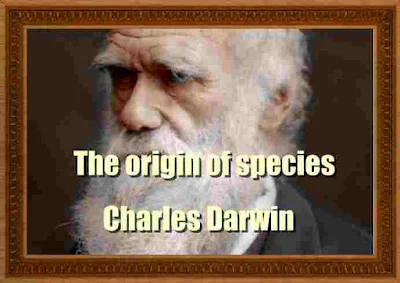The origin of species (1909) PDF ebook by Charles Darwin
The origin of species (1909) ebook by Charles Darwin
 |
| The origin of species (1909 by Charles Darwin |
Previously published as: On the origin of species by means of natural selection
Charles Robert Darwin, horn at Shrewsbury, England, on February 12, 1809, came of a family of remarkable intellectual distinction which is still sustained in the present generation. His father was a successful physician zvith remarkable powers of observation, and his grandfather was Erasmus Danvin, the well- knozvn author of "The Botanic Garden."He went to school at Shrewsbury, where he failed to profit from the strict classical curriculum there in force; nor did the regular professional courses at Edinburgh University, where he spent two years study- ing medicine, succeed in rousing his interest. In 1827 he was entered at Christ's College, Cambridge, to study for the B. A. degree, preparatory to entering the Church; hut zvhile there his friendship with Henslow, the professor of botany, led to his enlarging his general scientific knozvledge and finally to his joining the expedition of the "Beagle" in the capacity of a naturalist.
From this Darzmn returned after a voyage of five years with a vast first-hand knowledge of geology and zoology, a reputation as a successful collector, and, most important of all, with the germinal ideas of his theory of evolution. The next few years were spent in working up the materials he had col- lected; hut his health gave signs of breaking, and for the rest of his life he suffered constantly, but without complaint.
With extraordinary courage and endurance, he took up a life of seclusion and methodical regularity and accomplished his colossal results in spite of the most severe physical handicap. He had married in 1839, and three years later he withdrew from London to the little village of Dozvn, about sixteen miles out, where he spent the rest of his life.
His custom, which was almost a method, was to work till he was on the verge of complete collapse and then to take a holiday just sufficient to restore him to working condition. As early as 1842 Darwin had thrown into a rough form the outlines of his theory of evolution, but the enormous extent of the investigations he engaged in for the purpose of testing it led to a constant postponing of publication. Finally, in June 1858, A.R. Wallace sent him a manuscript containing a statement of an identical theory of the origin of species, which had been arrived at entirely independently.
On the advice of Lyell, the geologist, and Hooker, the botanist, Wallace's paper and a letter of Darivin's of the previous year, in ivhich he had outlined his theory to Asa Gray, zvere read together on July I, 1858, and published by the Linncean Society. In November of the following year "The Origin of Species" was published, and the great battle was begun between the old science and the new.
This work was followed in 1868 by his "Variation of Animals and Plants under Domestication," that in turn by the "Descent of Man" and that again by "The Expression of the Emo- tions in Man and Animals." Each of these books was the elabo- ration or complement of a section of its predecessor. The later years of Darwin's life were chiefly devoted to botanical research, and resulted in a series of treatises of the highest scientific value. He died at Down in April 1882 and is buried in Westminster Abbey.
The idea of the evolution of organisms, so far from originating with Darwin, is a very old one. Glimpses of it appear in the ancient Greek philosophers, especially Empedocles and Aristotle; modern philosophy from Bacon onward shows an increasing definiteness in its grasp of the conception; and in the age pre- ceding Darivin's, Buffon, Erasmus Darwin, and Lamarck had given it a fairly concrete expression. As we approach the date of the publication of "The Origin of Species" adherence to the doctrine not only by naturalists but by poets, such as Goethe, becomes comparatively frequent; and in the six years before the joint announcement of Darwin and Wallace, Herbert Spencer had been supporting and applying it vigorously in the field of psychology. To these partial anticipations, however, Darwin oiled little.
When he became interested in the problem, the doctrine of the fixity of species was still generally held; and his solution occurred to him mainly as the result of his own observation and thinking. Speaking of the voyage of the "Beagle," he says, "On my return home in the autumn of 1836 I immediately began to prepare my journal for publication, and then saw how many facts indicated the common descent of species. ... In July (1837) I opened my first note-book for facts in relation to the Origin of Species, about which I had long reflected, and never ceased working for the next twenty years. . . . Had been greatly struck from about the month of previous March on character of South American fossils, and species on Galapagos Archipelago.
These facts (especially latter) origin of all my views." Again, "In October (1838), that vs fifteen months after I had begun my systematic inquiry, I happened to read for amusement 'Malthus on Population,' and being well prepared to appreciate the struggle for existence which everywhere goes on from long-continued ob- servation of the habits of animals and plants, it at once struck me that under these circumstances favorable variations would tend to be preserved, and unfavorable ones to be destroyed. The result of this should be the formation of new species.
Published by New York: P.F. Collier









